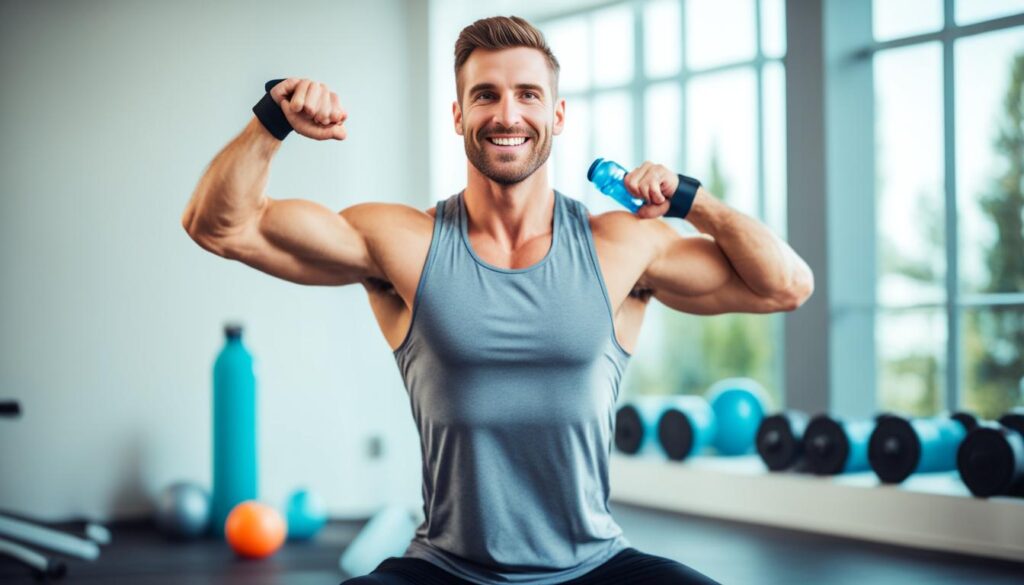Working out and keeping fit offers many rewards for both your body and mind. It helps you control weight and prevents illnesses. You feel happier, more energetic, sleep better, and have a good time with friends.
Key Takeaways:
- Regular exercise offers a wide range of benefits for your overall well-being.
- Exercise can help you control your weight and prevent excessive weight gain.
- Physical activity plays a crucial role in combating health conditions and diseases.
- Engaging in exercise enhances mood, relieves stress, and boosts happiness.
- Exercise improves energy levels, endurance, and muscle strength.
Exercise Controls Weight
Exercise helps keep your weight in check. It burns calories and stops extra pounds from sticking. It’s a must for managing your weight.
Being active is a good way to burn calories. The harder you work out, the more you lose. Running, cycling, swimming, or HIIT all help lose weight.
Staying active every day is important for weight control. Just moving more or choosing stairs helps. These little activities add up, making it easier to manage your weight.
Just exercise might not help you lose a lot of weight. Combining it with healthy eating works best. Eating well and exercising burns fat and leads to a healthier lifestyle.
“The great thing about exercise is that it’s completely within your control. You have the power to choose the type of activity you enjoy and the intensity level that suits your fitness level. The key is to find activities that you genuinely enjoy, so you’re more likely to stick with them and make exercise a habit.”
Adding exercise to your daily life has many health benefits besides weight control. So, choose something fun to stay active. Enjoy the benefits of regular exercise.
Now, let’s see how many calories different exercises burn. Check the table below:
| Exercise Activity | Calories Burned (Per hour) |
|---|---|
| Running (6 mph) | 590 |
| Cycling (moderate effort) | 420 |
| Swimming (vigorous effort) | 590 |
| Jumping rope | 680 |
| Strength training | 295 |
| Dancing (fast-paced) | 350 |
As shown in the table, different exercises burn many calories. Pick what you enjoy and fits your fitness. Let’s make exercise fun and effective for calorie-burning.
Exercise Combats Health Conditions and Diseases
Regular exercise is key for staying healthy and warding off diseases. Adding physical activities to your daily life helps you tackle many health issues. This way, you lower the chances of getting serious conditions.
Preventing Heart Disease
Exercise is a strong guard against heart disease. Doing activities like walking, running, or biking can make your heart stronger. It also boosts blood flow, which lowers your heart disease risk and its effects.
Managing Type 2 Diabetes
Being active is vital in handling type 2 diabetes. It keeps your blood sugar in check and makes your body respond better to insulin. Plus, it aids in weight loss and reduces diabetes risks.
Reducing the Risk of Cancer
Working out reduces your chances of certain cancers. It balances hormones, strengthens immunity, and helps digestion, cutting your cancer risk.
Strengthening Mental Health
Exercise greatly benefits your mind and feelings. It fights depression, lifts your spirit, and cuts stress. The brain’s release of endorphins when you work out makes you feel better.
Enhancing Cognitive Function
Workouts also make you smarter and improve memory. They boost blood flow to your brain and help grow new cells. This keeps your brain healthy by releasing special chemicals.
Improving Bone and Joint Health
Keeping active is essential for strong bones and flexible joints. Activities with weight on your body, like walking, dancing, or lifting weights, boost bone health. And, exercises that strengthen help keep joints steady and flexible.
Preventing Falls and Improving Balance
Becoming better at balance may stop falls, especially for older folks. Doing tai chi or yoga can make you steadier. This lowers the risk of getting hurt from a fall.
Health Conditions and the Benefits of Exercise
| Health Condition | Benefits of Exercise |
|---|---|
| Heart Disease | Lower blood pressure, improved heart health |
| Type 2 Diabetes | Better blood sugar control, increased insulin sensitivity |
| Cancer | Reduced risk, improved overall health |
| Depression and Anxiety | Elevated mood, reduced symptoms |
| Cognitive Function | Improved memory, enhanced concentration |
| Bone and Joint Health | Increased bone density, improved joint stability |
| Falls Prevention | Better balance, reduced risk of falls |
Working out is your best defense against many health problems. Making exercise part of your everyday life is a sure way to boost wellness. It also cuts down your risk of falling ill.

Exercise Improves Mood
Exercise has a big impact on how we feel. It’s been shown to make us happier and lower stress. When we work out, our mood gets a big boost.
Our bodies release endorphins when we exercise. These are the “feel-good” hormones. They help with stress and anxiety. You’ll feel happier and more relaxed after a workout.
Working out also boosts serotonin. This brain chemical is linked to feeling happy. Keeping serotonin levels up can make us feel good more often.
“Exercise is like an antidepressant; it not only helps to lift your mood but also contributes to long-term happiness.” – Laura Vanderkam
Regular exercise can make us more confident too. It’s about setting and reaching goals. Getting better at your workouts shows you what you can achieve. This can make a big difference in how you see yourself.
Reduce Stress and Find Increased Happiness through Exercise
Stress can really bring us down. But, exercise is a great way to deal with it. It’s a healthy way to keep stress at bay.
When we work out, our body starts to relax. This means less cortisol, the stress hormone. Over time, exercise helps us feel happier by lowering our stress.
There are many ways to be active. Running, yoga, or playing sports, find what you love. Having fun will make you want to keep going. So, try different things until you find what makes you happy.
Put exercise high on your to-do list every day. A quick walk, gym time, or dancing can do wonders. You’ll see a big improvement in your mood and stress. And, you might find a new source of joy.
Exercise Boosts Energy
Regular exercise is key to higher energy and better stamina. It focuses on boosting energy, more endurance, and stronger muscles. This leads to a big increase in how much energy you have every day.
One way exercise helps is by making your muscles stronger. This makes tasks easier and you can keep going for longer without tiring. Working out like weightlifting, yoga, or even walking briskly makes your muscles stronger. This makes everyday activities simpler.
Exercising also makes your heart and lungs work better. It delivers more oxygen and nutrients to your body. By doing activities like walking fast, cycling, or swimming, your heart grows stronger. It uses oxygen more efficiently, giving you a day-long energy boost.
Exercise for Improved Energy: Tips and Strategies
- Do activities that boost energy and endurance, like running, cycling, or dancing.
- Add strength exercises to your routine for stronger muscles and more stamina.
- Change up your routine to stay interested and spend more energy.
- Drink enough water when working out to keep your energy up.
- Eat right to give your body what it needs before and after workouts.
- Set attainable goals and follow your progress to stay on track.
- Pay attention to how your body feels. Adjust your workouts to avoid getting too tired or hurt.
Making exercise a regular part of your life can change a lot. You get more energy, better endurance, and stronger muscles. It helps you face daily life’s challenges with more life in you.
“Exercise not only improves your body, it improves your mind, your attitude, and your mood.” – Kemi Sogunle

Exercise Promotes Better Sleep
Sticking to regular exercise can really help you sleep better. It goes beyond making you physically fit. It also ensures you get a good night’s sleep. By adding work-outs to your daily life, you get better sleep quality and find it easier to fall asleep.
Exercise boosts your body temperature. But when you cool down post-workout, it tells your body to slow down for the day. This helps you start sleeping quicker.
Working out doesn’t just make you tired. It also makes your sleep deeper. Moving around releases endorphins. These natural chemicals can lower stress and improve your mood. They help you sleep more soundly and wake up feeling refreshed.
Exercise helps the body fall asleep faster, achieve deeper sleep, and improve overall sleep quality.
Plus, exercise helps you get better sleep overall. Why? It’s because it fixes your internal sleep clock, which depends on when you’re active. A steady routine can give you really good and healthy sleep.
But, when you exercise is also key. Too close to bedtime and you might be too alert to fall asleep. Try to wrap up your workout a few hours before going to bed. This way, your body has enough time to chill out and get ready for sleep.
Exercise Tips for Better Sleep:
- Incorporate at least 30 minutes of moderate-intensity aerobic exercise, such as brisk walking or cycling, into your daily routine.
- Consider engaging in relaxation exercises, such as yoga, before bed to promote a calm and relaxed state of mind.
- Choose activities that you enjoy and that are sustainable in the long term to ensure consistency and maximize the sleep benefits of exercise.
| Exercise for Better Sleep | Improved Sleep Quality | Faster Sleep Onset |
|---|---|---|
| Engage in regular physical activity | Establish a consistent sleep routine | Avoid exercising too close to bedtime |
| Choose moderate-intensity aerobic exercises | Release endorphins for relaxation | Allow time for the body to cool down |
| Practice relaxation exercises, such as yoga | Regulate circadian rhythms | Achieve a more restful sleep |
Exercise Puts the Spark Back Into Your Sex Life
Regular exercise doesn’t just better your health. It also boosts your sex life. Being active increases energy, confidence, and better sex for both genders.
Staying fit is key to staying healthy in bed. Exercise increases your power and stamina. This makes time between the sheets more enjoyable.
When you work out, your body makes endorphins. These are your happiness hormones. They make you feel good, less stressed, and more in the mood.
Walking, running, or lifting weights boosts blood flow too. This makes your body more sensitive and ready for fun.
Exercise is great for your body and your love life. It keeps you fit, happy, and closer with your partner.
Feeling and looking good from exercise makes sex better. Plus, more exercise means more energy all day. This fights tiredness and keeps you moving.
Workouts are not just good for your body. They make life more fun. This means better energy and more love.
Never forget to talk to a doctor before starting any new workouts. This is very important if you are not feeling well. They will give you advice to keep you safe and healthy.

| Benefits of Exercise for Sexual Health |
|---|
| Improved energy levels |
| Enhanced arousal |
| Increased self-confidence |
| Better sexual function |
| Enhanced body image |
Exercise Can Be Fun and Social
Exercise doesn’t have to be boring or hard work. It can bring joy, fun, and allow you to make friends. Finding fun activities, like dancing or playing sports, makes exercise easier. It also helps you enjoy the company of others.
There are many ways to make exercise social. You could take a dance class, play basketball with friends, or go hiking. These activities make working out more fun and keep you coming back for more.
Fun Ideas for Exercise
Here are some fun ways to stay active and have a blast:
- Dance classes: Salsa, hip-hop, or ballroom dancing are great for moving, expressing yourself, and meeting new friends.
- Outdoor adventures: Hike, kayak, or rock climb in beautiful places to have fun, get fit, and bond with loved ones.
- Team sports: Playing soccer, volleyball, or softball in leagues is fun and helps you build strong friendships.
- Group fitness classes: Join Zumba, spinning, or yoga to exercise with others, enjoy great music, and make friends.
- Walking or jogging meet-ups: Join groups to walk or run together and meet people with similar health goals in your area.
It’s important to pick activities that you like. When you enjoy what you do, exercise feels like fun, not work.
“Exercise is essential, but it doesn’t have to be boring or solitary. Find activities that bring you joy and allow you to connect with others. When you combine exercise with fun and socialization, it becomes a lifelong pursuit.”
So, ask a friend, family, or co-worker to find new ways to exercise together. It’s a great way to keep each other motivated and create great memories.
Having fun and being social makes sticking to exercise easier. It keeps you interested and on track with your health goals!
Guidelines for Exercise and Physical Activity
Following exercise guidelines is key for a healthy lifestyle. The U.S. Department of Health and Human Services offers tips. These can help you stay healthy and active.
Adults should get at least 150 minutes of moderate or 75 minutes of vigorous exercise each week. Choose from activities like brisk walking, cycling, swimming, or dancing. These exercises boost your heart health, increase endurance, and burn calories.
It’s also vital to do strength training. Work all your major muscles two times a week. You can do this with weightlifting, resistance bands, or bodyweight moves. Strength training makes you stronger, improves bone strength, and helps you function better.
By sticking to these routines, you get the most out of both aerobic and strength exercises. Start slowly and boost your workout’s difficulty and length over time. Listen to your body, and get advice from a health expert before a new routine.

Starting and Maintaining an Exercise Routine
Adding exercise to your daily routine has so many good effects. It helps your health and wellness. But, getting started and sticking to it can be hard. Here are tips to break through and keep moving.
- Start small and gradually increase intensity and duration
- Find activities you enjoy
- Set achievable goals
- Track your progress
- Overcome barriers
At the start, go easy and then slowly ramp up your workouts. This prevents your body from getting shocked and hurt. For example, begin with a 10-minute walk. Then, stretch it to 30 minutes as you get used to moving. This way, you get stronger and stick to your exercise plan better.
Choosing exercises that you love is key. It could be dancing, swimming, biking, or team sports. Doing what you enjoy keeps you excited and committed. Try different activities until you find what you like best.
Having realistic goals helps you exercise regularly. Aim for things you can really do based on your fitness level and life. You might want to work out three times a week or hit a step count daily. Meeting these goals boosts your drive to keep going.
Keeping a workout journal or using a fitness app helps. It shows how much you’ve improved. This progress checking keeps you excited and keeps you exercising.
Figure out what stops you, then find solutions. For example, plan your workouts in your schedule to dodge the time problem. If staying motivated is hard, find a friend to exercise with or join a group. This helps keep you on track.
Always talk to a doctor before you begin new exercises, especially if there’s any health concern. By making exercise a regular part of your life and getting over hurdles, you’ll enjoy better health and well-being.
Conclusion
Regular exercise and physical activity offer numerous benefits. They can improve your health and well-being a lot. By adding exercise to your life daily, you can enjoy many rewards. These include better physical, mental, and emotional health.
Exercise is much more than managing weight or avoiding sickness. It’s about leading a healthier life. Being active helps you get fitter, makes your muscles stronger, and improves your heart health. Yet, its good effects aren’t just physical. Exercise makes you happier, boosts energy, and helps with sleep.
Remember, even a little activity is better than none. You can walk fast, do yoga, or enjoy dancing. Find what you like and make it a fun part of your routine. Start with small steps and slowly do more. Make sure you talk to a healthcare pro about the best plan for you and any health issues.
So, welcome the benefits of staying active. Put regular exercise high on your to-do list. Your body, mind, and general health will be glad you did.
FAQ
What are the benefits of exercise?
Exercise can do so much for us. It keeps our weight in check and fights off diseases. It makes us feel happy, more energetic, and helps us sleep better. It even helps us do better in the bedroom and keeps us social.
How does exercise help control weight?
Working out burns calories and keeps the pounds off. Any activity helps, and the harder you work, the more calories you burn. This makes it easier to stay at a healthy weight.
Can exercise combat health conditions and diseases?
Absolutely, exercise is like a shield against many diseases. Heart issues, high blood pressure, and even depression don’t stand a chance when you are active. It also helps protect us from falling down as we age and keeps our minds sharp.
How does exercise improve mood?
Being active releases chemicals in our brain that make us happy and calm. This is why you feel great after a workout. And when you see yourself getting stronger, it boosts your confidence, making you feel even better.
Does exercise boost energy?
Exercise increases your endurance and muscle strength. It gets the heart and lungs working better, pumping more energy to your body. This is why active people always seem ready to take on the day.
Can exercise promote better sleep?
Exercise does help you sleep, but it’s best done earlier in the day. It makes it easier to fall asleep and makes your sleep deeper and more refreshing. Just don’t do it right before bed.
Can exercise improve sexual health?
Working out doesn’t just make you look better; it boosts your energy for the bedroom, too. It helps men and women do better sexually, and makes women more in the mood. Plus, it lowers the chance of men having problems down there.
Is exercise fun and social?
Yes, moving more can be fun and bring people together. Activities like dancing or hiking make you happy and help build closer relationships. The key is to find what makes you excited to keep at it.
What are the guidelines for exercise and physical activity?
Adults should aim for about 150 minutes of moderate exercise a week or 75 minutes of more intense exercise. And don’t forget to include strength training. This should be done a couple of times a week for all major muscle groups.
How can I start and maintain an exercise routine?
Start small and grow your routine slowly. Doing activities you love and setting goals you can beat are essential. Remember, there will always be challenges, but getting active is totally worth it. And don’t forget to check with your doctor before starting something new.
What is the conclusion about the benefits of exercise?
Exercise is really, really good for us. Doing it keeps us healthy in body and mind. Just moving more, even if it’s not much, is better than doing nothing. The secret is finding what you love, so sticking with it feels natural and fun.




















